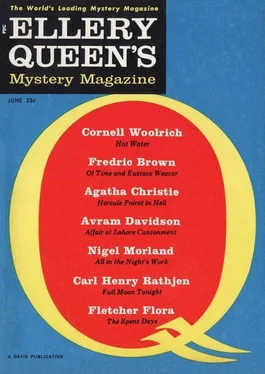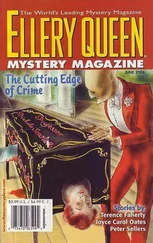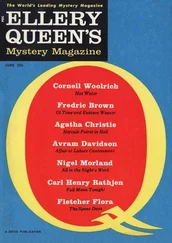Фредерик Браун - Ellery Queen’s Mystery Magazine. Vol. 37, No. 6. Whole No. 211, June 1961
Здесь есть возможность читать онлайн «Фредерик Браун - Ellery Queen’s Mystery Magazine. Vol. 37, No. 6. Whole No. 211, June 1961» весь текст электронной книги совершенно бесплатно (целиком полную версию без сокращений). В некоторых случаях можно слушать аудио, скачать через торрент в формате fb2 и присутствует краткое содержание. Город: New York, Год выпуска: 1961, Издательство: Davis Publications, Жанр: Классический детектив, на английском языке. Описание произведения, (предисловие) а так же отзывы посетителей доступны на портале библиотеки ЛибКат.
- Название:Ellery Queen’s Mystery Magazine. Vol. 37, No. 6. Whole No. 211, June 1961
- Автор:
- Издательство:Davis Publications
- Жанр:
- Год:1961
- Город:New York
- ISBN:нет данных
- Рейтинг книги:5 / 5. Голосов: 1
-
Избранное:Добавить в избранное
- Отзывы:
-
Ваша оценка:
- 100
- 1
- 2
- 3
- 4
- 5
Ellery Queen’s Mystery Magazine. Vol. 37, No. 6. Whole No. 211, June 1961: краткое содержание, описание и аннотация
Предлагаем к чтению аннотацию, описание, краткое содержание или предисловие (зависит от того, что написал сам автор книги «Ellery Queen’s Mystery Magazine. Vol. 37, No. 6. Whole No. 211, June 1961»). Если вы не нашли необходимую информацию о книге — напишите в комментариях, мы постараемся отыскать её.
Ellery Queen’s Mystery Magazine. Vol. 37, No. 6. Whole No. 211, June 1961 — читать онлайн бесплатно полную книгу (весь текст) целиком
Ниже представлен текст книги, разбитый по страницам. Система сохранения места последней прочитанной страницы, позволяет с удобством читать онлайн бесплатно книгу «Ellery Queen’s Mystery Magazine. Vol. 37, No. 6. Whole No. 211, June 1961», без необходимости каждый раз заново искать на чём Вы остановились. Поставьте закладку, и сможете в любой момент перейти на страницу, на которой закончили чтение.
Интервал:
Закладка:
The Countess’s face lit up with enthusiastic motherhood.
“The beloved angel! So big now. such shoulders, so handsome! He is in America. He builds there — bridges, banks, hotels, department stores, railways, anything the Americans want!”
Poirot looked slightly puzzled.
“He is then an engineer? Or an architect?”
“What does it matter?” demanded the Countess. “He is adorable! He is wrapped up in iron girders, and machinery, and things called stresses. The kind of things that I have never understood in the least. But we adore each other — always we adore each other! And so for his sake I adore the little Alice. But, yes, they are engaged. They meet on a plane or a boat or a train, and they fall in love, all in the midst of talking about the welfare of the workers. And when she comes to London she comes to see me and I take her to my heart.”
The Countess clasped her arms across her vast bosom, “And I say, ‘You and Niki love each other — so I too love you — but if you love him why do you leave him in America?’ And she talks about her ‘job’ and the book she is writing and her career, and frankly I do not understand, but I have always said one must be tolerant.” She added all in one breath, “And what do you think, cher ami, of all this that I have imagined here?”
“It is very well imagined,” said Poirot, looking round him approvingly. “It is chic! ”
The place was full and it had that unmistakable air of success which cannot be counterfeited. There were languid couples in full evening dress, Bohemians in corduroy trousers, stout gentlemen in business suits. The band, dressed as devils, dispensed hot music. No doubt about it, the night club called Hell had caught on,
“We have all kinds here,” said the Countess. “That is as it should be, is it not? The gates of hell are open to all?”
“Except, possibly, to the poor?” Poirot suggested.
The Countess laughed.
“Are we not told that it is difficult for a rich man to enter the kingdom of heaven? Naturally, then, he should have priority in hell.”
The Professor and Alice were returning to the table. The Countess got up.
“I must speak to Aristide.”
She exchanged some words with the head waiter, a lean Mephistopheles, then went round from table to table, speaking to the guests.
The Professor, wiping his forehead and sipping a glass of wine, remarked, “She is a personality, is she not? People feel it.”
He excused himself as he went over to speak to someone at another table. Poirot, left alone with the severe Alice, felt slightly embarrassed as he met the cold blue of her eyes. He recognized that she was actually quite good-looking, but he found her distinctly alarming.
“I do not yet know your last name,” he murmured.
“Cunningham. Doctor Alice Cunningham. You have known Vera in past days, I understand?”
“Twenty years ago it must be.”
“I find her a very interesting study,” said Dr. Alice Cunningham. “Naturally I am interested in her as the mother of the man I am going to marry, but I am interested in her from the professional standpoint as well.”
“Indeed?”
“Yes. I am writing a book on criminal psychology. I find the night life of this place very illuminating. We have several criminal types who come here regularly. I have discussed their early life with some of them. Of course, you know all about Vera’s criminal tendencies — I mean that she steals?”
“Why, yes — I know that,” said Poirot, slightly taken aback.
“I call it the Magpie complex myself. She takes, you know, always glittering things. Never money. Always jewels. I find that as a child she was petted and indulged but very much shielded. Life was unendurably dull for her — dull and safe. Her nature demanded drama — it craved for punishment . That is at the root of her indulgence in theft. She wants the importance, the notoriety of being punished! ”
Poirot objected, “Her life can surely not have been safe and dull as a member of the ancien régime in Russia during the Revolution?”
A look of faint amusement showed in Miss Cunningham’s pale blue eyes.
“Ah,” she said. “A member of the ancien règime? She has told you that?”
“She is undeniably an aristocrat,” said Poirot staunchly, fighting back certain uneasy memories of the wildly varying accounts of her early life told him by the Countess herself.
“One believes what one wishes to believe,” remarked Miss Cunningham, casting a professional eye on him.
Poirot felt alarmed. In a moment, he felt, he would be told what was his complex. He decided to carry the war into the enemy’s camp. He enjoyed the Countess Rossakoff’s society partly because of her aristocratic provenance, and he was not going to have his enjoyment spoiled by a spectacled little girl with boiled gooseberry eyes and a degree in psychology!
“Do you know what I find astonishing me?” he asked.
Alice Cunningham did not admit in so many words that she did not know. She contented herself with looking bored but indulgent.
Poirot went on, “It amazes me that you — who are young, and who could look pretty if you took the trouble — well, it amazes me that you do not take the trouble! You wear the heavy coat and skirt with the big pockets as though you were going to play the game of golf. But it is not here, the golf links, it is the underground cellar and your nose it is hot and shines, but you do not powder it, and the lipstick you put it on your mouth without interest, without emphasizing the curve of the lips! You are a woman, but you do not draw attention to the fact of being a woman. And I say to you, ‘Why Not’? It is a pity!”
For a moment he had the satisfaction of seeing Alice Cunningham look human. He even saw a spark of anger in her eyes. Then she regained her smiling contempt.
“My dear M. Poirot,” she said, “I’m afraid you’re out of touch with the modern ideology. It is fundamentals that matter — not the trappings.”
She looked up as a dark and very beautiful young man came toward them.
“This is a most interesting type,” she murmured with zest. “Paul Varesco! Lives on women and has strange depraved cravings! I want him to tell me more about a nursery governess who looked after him when he was three years old.”
A moment or two later she was dancing with the young man. He danced divinely. As they drifted near Poirot’s table, Poirot heard her say, “And after the summer at Bog-nor she gave you a toy crane? A crane — yes, that’s very suggestive.”
For a moment Poirot allowed himself to toy with the speculation that Miss Cunningham’s interest in criminal types might lead one day to her mutilated body being found in a lonely wood. He did not like Alice Cunningham, but he was honest enough to realize that the reason for his dislike was the fact that she was so palpably unimpressed by Hercule Poirot!
Then he saw something that momentarily put Alice Cunningham out of his head.
At a table on the opposite side of the floor sat a fair-haired young man. He wore evening dress, his hair shone, his mustache was such as the Guards affect, his whole demeanor was that of one who lived a life of case and pleasure. Opposite him sat the right kind of expensive girl.
He was gazing at her in a fatuous and foolish manner. Anyone seeing them might have murmured: The idle rich! Nevertheless Poirot knew very well that the young man was neither rich nor idle.
He was, in fact, Detective-Inspector Charles Stevens, and it seemed probable to Poirot that Detective-Inspector Stevens was here on business.
On the following morning Poirot paid a visit to Scotland Yard to his old friend, Chief Inspector Japp.
Читать дальшеИнтервал:
Закладка:
Похожие книги на «Ellery Queen’s Mystery Magazine. Vol. 37, No. 6. Whole No. 211, June 1961»
Представляем Вашему вниманию похожие книги на «Ellery Queen’s Mystery Magazine. Vol. 37, No. 6. Whole No. 211, June 1961» списком для выбора. Мы отобрали схожую по названию и смыслу литературу в надежде предоставить читателям больше вариантов отыскать новые, интересные, ещё непрочитанные произведения.
Обсуждение, отзывы о книге «Ellery Queen’s Mystery Magazine. Vol. 37, No. 6. Whole No. 211, June 1961» и просто собственные мнения читателей. Оставьте ваши комментарии, напишите, что Вы думаете о произведении, его смысле или главных героях. Укажите что конкретно понравилось, а что нет, и почему Вы так считаете.












